Honouring John ‘Plumb’ Bond – Soldier, Sportsman, and Servant of the Game
 As Anzac Day approaches, we continue a proud tradition of honouring those who served both our nation and our club. In years past, we were privileged to receive stories unearthed by our dedicated club historian, Steve “Chisel” Gill, who devoted countless hours to highlighting the lives of club members who answered the call of duty.
As Anzac Day approaches, we continue a proud tradition of honouring those who served both our nation and our club. In years past, we were privileged to receive stories unearthed by our dedicated club historian, Steve “Chisel” Gill, who devoted countless hours to highlighting the lives of club members who answered the call of duty.
This year, Chisel proposed that we remember John Bond, a member of the Australian Imperial Force (AIF) and premiership-winning First Grade coach with MCRC from 1932–1935. Bond’s legacy is intertwined with that of another local rugby pioneer, Horace Pountney, a past administrator and coach with Wanderers RFC, who also served in the AIF team. Together, Bond and Pountney were instrumental in reconstituting the Newcastle Rugby Union (NRU) competition in 1924, a vital step in reviving the game after the Great War.
Thanks to Chisel’s tireless efforts, we are proud to share the story of John ‘Plumb’ Bond.
Johnny Bond – a life of service and sport
Born in Newcastle on 8 June 1892, John Herbert Bond (affectionately known as Johnny or Plumb) was the son of Robert Bond, a prominent local businessman and six-time Mayor of Wickham. A carpenter by trade, Johnny developed into a talented rugby forward, playing for North Newcastle RLFC after graduating from Wickham Public School. He helped North Newcastle RLFC win back-to-back premierships in 1910 and 1911.
Military Life
At the age of 22, Johnny enlisted in the AIF on 18 July 1915 and served in the 30th Australian Infantry Battalion as a Company Quartermaster Sergeant (CQMS), holding service number 356. He departed Australia aboard His Majesty’s Australian Transport (HMAT) Beltana on 9 November 1915 and returned home on HMAT Orontes on 15 May 1919.
His courage in battle was formally recognised when he was awarded the Meritorious Service Medal for leading ration carrying parties during a crucial attack on the Hindenburg Line on 8–9 July 1918. His award was gazetted on 6 October 1919.
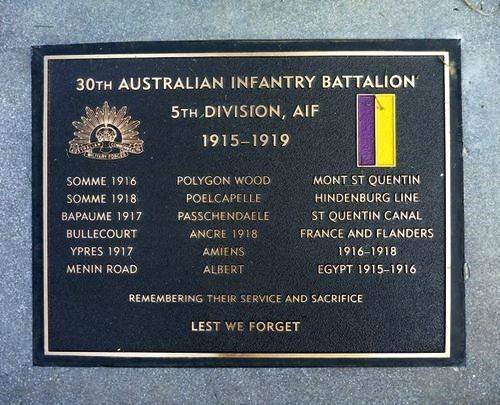
The AIF Rugby Team and the Revival of the Game
In 1919, while awaiting repatriation after the Great War, Johnny Bond joined the AIF rugby team, which played a landmark series of matches in the United Kingdom and later in Australia. Alongside Horace Pountney, Johnny helped bring this team to life, an effort that symbolised a return to normalcy and camaraderie after the devastation of the great war.
The team was assembled to compete in The King’s Cup, a prestigious post-war rugby tournament hosted in England. It featured teams from England (predominantly officers), Australia (with only a few officers), Canada, and New Zealand. In a fiercely contested match, the AIF team edged out New Zealand in a thrilling 6–5 victory. However, New Zealand ultimately won the tournament.
Upon returning home, the AIF side was invited to tour Australia, with a mission to reignite interest in rugby union. During the war, countless club players had enlisted in the armed forces, forcing rugby union in NSW and Queensland into a standstill, while rugby league continued uninterrupted. The AIF team became the perfect vehicle to relaunch the game, offering spectators a spectacle of fast, physical, running rugby.
Over the course of 12 months, the AIF team played eight matches across Australia, winning all of them. Their dynamic, crowd-pleasing style set a new standard for how the game could be played, and how it should be played. In fact, the 1920 and 1921 Wallabies went on to adopt this running rugby model, cementing its influence in the national game.
Johnny Bond stood out as one of the premier forwards in that historic side, bringing leadership, skill, and relentless energy to the field. The AIF tour did more than just entertain, it breathed life back into Australian rugby, giving the game the momentum it needed to thrive again after the long pause of wartime.
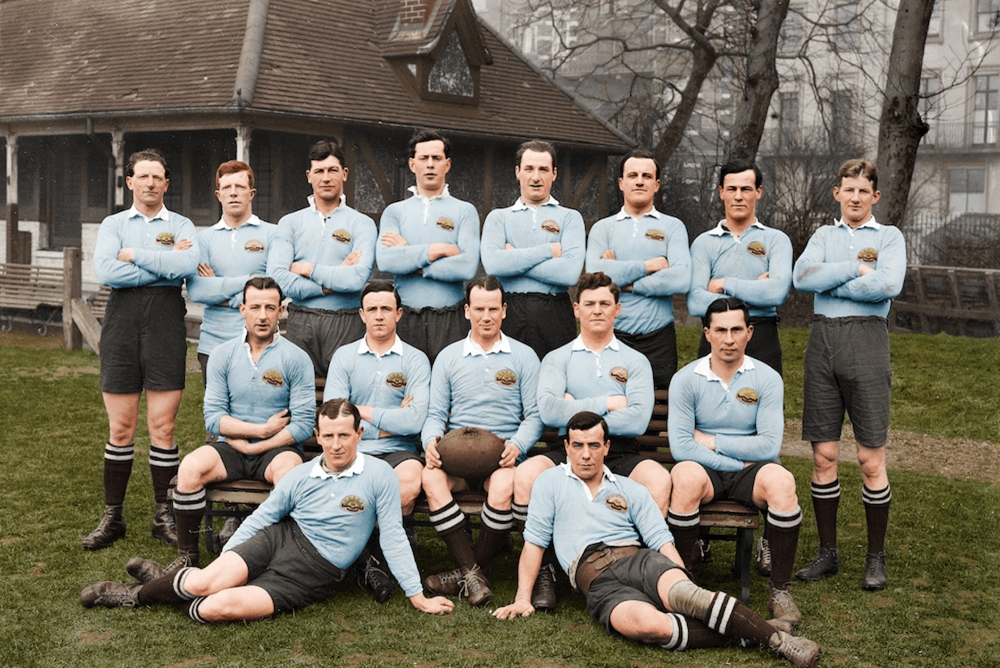
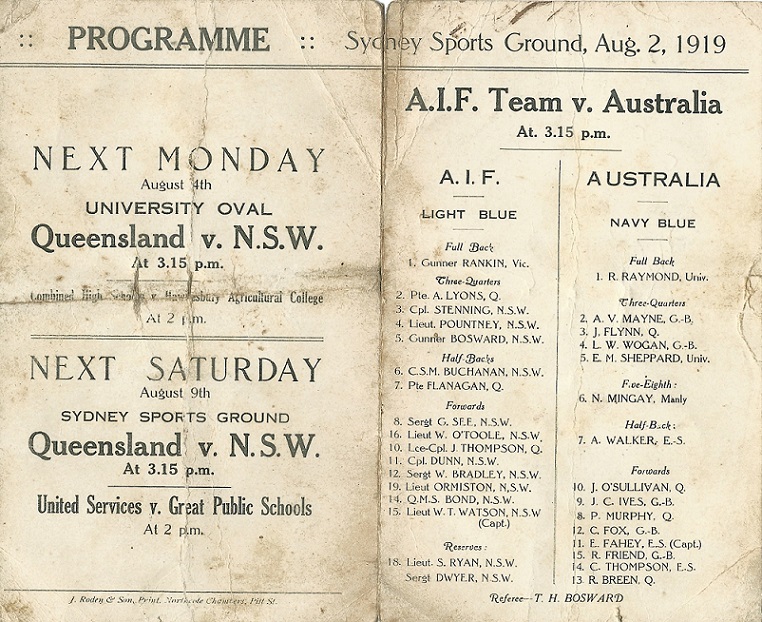
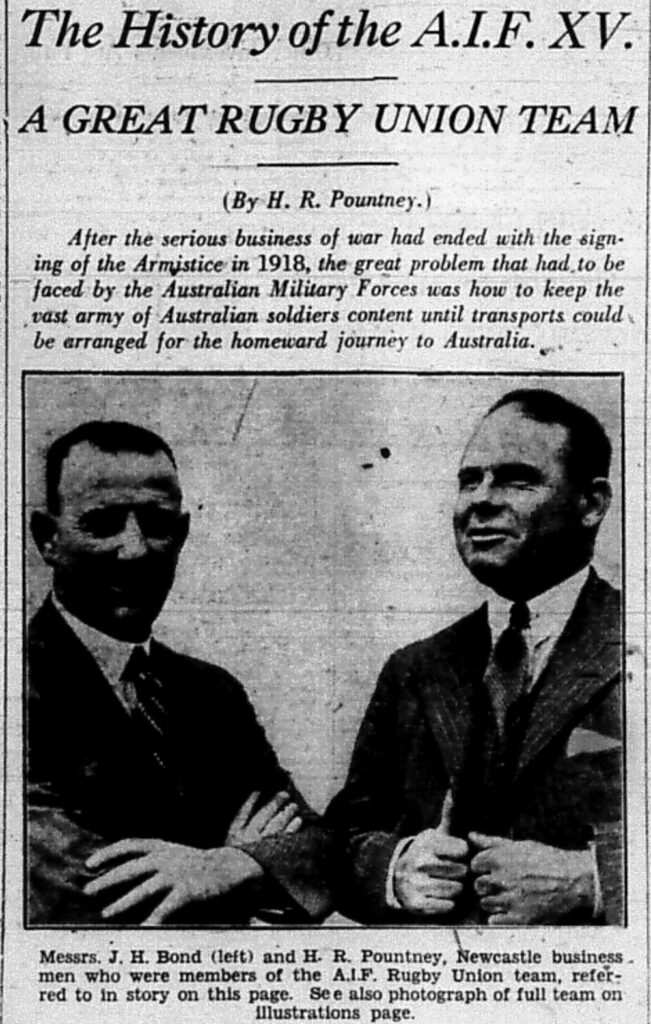
Rugby Post-War
After his military discharge, Johnny joined the Glebe-Balmain RFC, and in 1920, he made his international debut against New Zealand. He played all three Tests at the Sydney Sports Ground, scoring a memorable try in the second Test through sheer determination and support play. Bond also toured New Zealand in 1921, playing eight of ten matches, including the lone Test in Christchurch.
In total, Johnny earned four Test caps and played seven non-Test matches for Australia, officially recognised as Wallaby No. 148.
Rebuilding Rugby in Newcastle
In 1924, Bond and Pountney were instrumental in resurrecting rugby in Newcastle, forming what would evolve into the Newcastle Hunter Rugby Union. They successfully petitioned the council to support the formation of the Newcastle Rugby Union, which saw overwhelming community support. At the inaugural meeting, Pountney was elected Secretary, with our own Dr Idris Morgan appointed Medical Officer. From there, a Newcastle representative XV was formed, with Bond and Pountney as coaches, thus helping to keep the sport alive in the region.
Bond and Pountney later went on to square off as rival coaches, Pountney for Wanderers and Bond for Merewether. From 1932 to 1935, Bond led MCRC to multiple premierships, a testament to his leadership and deep rugby knowledge.
A Legacy of Service, Sport, and Community
Johnny Bond’s life is a testament to service, on the battlefield, on the rugby field, and in the community. He was a pioneer, a leader, and an inspiration whose contributions to our club and our sport live on.
This Anzac Day, we honour his memory and the values he stood for: courage, commitment, and community.
Lest we forget.
Sonya Chapman
Continuing the work of Steve Chisel Gill

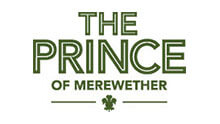









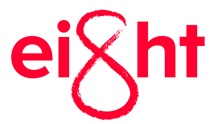



Social NewsNews and information
Merewether Carlton Rugby Club
Merewether Carlton Highlights @carltonrugby
@carltonrugby Rugby Union Club
merewethercarlton
Official account of Merewether Carlton Rugby Union Club 🟢
2024 Premiers 🏆
Est. 1930
#bleedgreen